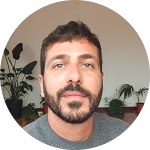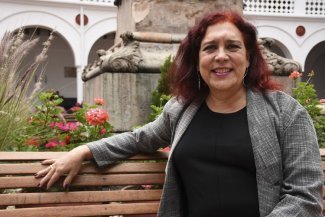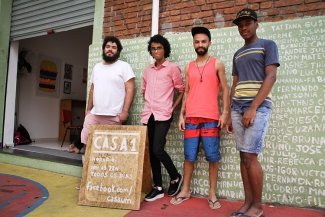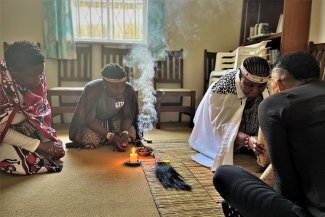
A street action by the Maricas Bolivia Movement in front of the San Francisco Basilica in La Paz on 12 May 2023.
It is a clear Friday morning in mid-May and the sun is already beating down on the city of La Paz, perched at an altitude of 4,000 metres. The square in front of the San Francisco Basilica, a major Catholic church in the city centre, is awash with the usual comings and goings of passers-by, the chanting of street vendors and the insistent blaring of horns from the road.
In the middle of the square, there is one scene that breaks with the everyday hustle and bustle. Edgar Soliz sets out a small wooden table and two folding chairs, one for himself and the other for Pewmma, a trans Chilean Mapuche teacher, the star guest of today’s interview on the subject of sex education in schools. The small table features a selection of figurines evoking ancestral Andean rituals: two llamas kissing, a mochica ceramics piece and reproductions of the Pachamama and Chacha Puma deities. In front of the table, is a sign with large lettering that reads ‘Maricas Bolivia’, the name of the movement hosting the interview and the YouTube channel on which it will be broadcast. A few metres away, Roberto Carita, another member of the collective, has prepared the equipment needed for the shoot.
The set is ready. Edgar adjusts his big necklace and his ornate earrings and the interview begins. “Welcome to this new street action of the Maricas Bolivia Movement,” says Edgar, looking at the camera. “As we do every week, we are occupying the public space to make an audiovisual product, staging a political takeover of the public space, because we firmly believe that discussions about sexual dissidences should be held in public, to disestablish the hegemony of compulsory heterosexuality.”
Some passers-by stop and listen with interest while others throw disapproving glances while muttering insults or make the sign of the cross as they go by. Whether the reaction is one of approval or rejection, the goal has been achieved: a black swan has courageously occupied the centre of the square, upsetting the established balance of power in the public space.
The origins of a radical, cross-cutting movement
The Maricas Bolivia Movement was founded in 2010 by a group of LGBTQI+ activists from La Paz, within the training school of Radio Deseo, run by the feminist collective Mujeres Creando (Women Creating). “We wanted to speak out in the first person, to counter the stereotypical and sensationalist views that others were expressing about our bodies,” explains Roberto.
During its five years producing radio programmes at Radio Deseo, the movement built its political capacities and developed its militant journalism, broadcasting first-hand testimonies from the most marginalised members of the LGBTQI+ community, from both urban and rural Indigenous communities. Right from its very first programme, Habemus Maricas, the movement raised a furore by interviewing a homosexual priest to point the finger at the hypocrisy of the Church, which has a huge influence over Bolivian culture.
The movement’s radical and subversive nature was clear from the moment it chose its name. ‘Marica’ is the most common insult directed at homosexual men in the Spanish language.
“Calling ourselves ‘maricas’ wasn’t easy at first, because it’s a word that has always violated our bodies, but thanks to the feminist training provided by Mujeres Creando and the literature of Latin American marica intellectuals, we learned about the strategy of reclaiming a term used as an insult and resignifying it,” says Edgar.
The activists explain that there is a dual purpose to this reappropriation. Firstly, it serves to neutralise the violent impact of the word, which, when used to define oneself, can no longer work as a homophobic insult. Secondly, by calling themselves ‘maricas’, the activists intended to stimulate a process of self-examination within the Bolivian LGBTQI+ community.
“We were quick to realise that we were strongly opposed to the term ‘gay’, which is an English word that’s foreign to our context,” Edgar continues. “It’s a neocolonial term from the Global North, which imposes priorities, names, acronyms and norms on the activism in the South too. Why should I see myself as ‘gay’, which conjures up the image of a white, young, handsome, masculine and economically prosperous individual, when our reality is one of third-world, Indigenous, economically vulnerable, jobless, corpulent, HIV-positive ‘maricas’?”
Edgar identifies ethnically as Quechua and Roberto as Aymara, the two main Indigenous peoples of the Andean region. They belong to the first generation born in an urban context, following their parents’ departure from rural communities.
“I grew up listening to Quechua but I refused to learn it because, in Bolivian society’s colonial mindset, progress is hegemonic whiteness. I have suffered racism and classism in the city precisely because I am an Indian, and at some point in my life this led me to hate myself, to reject myself as an Indian. And in the LGBT community, precisely because of the colonisation of the social imaginary, the aspiration to be white is even stronger!”
It was only by thinking of themselves outside the ‘gay’ category that Edgar and Roberto were able to reconcile the multiple aspects of their identities. They then went on to make this the key focus of their political activism. This has enabled the collective to ‘transversalise’ the fight to give greater visibility to sexual differences, by including reflections on ethnic identity and social class.
In doing so, they have escaped what they call the ‘self-ghettoisation’ of the institutional movement, which “allows itself to be co-opted by pink capitalism and so-called international cooperation, takes no interest in any other marginalised groups and trivialises the struggle by organising the usual marches on the dates and in the ways permitted,” says Roberto. “This is how the social reality is disguised, by pretending that everything is fine and that homolesbotransphobia has vanished.”
But the reality is very different. The situation in Bolivia shows that formal rights alone are not enough. The 2009 constitution, which emerged as part of the “process of change” led by Evo Morales, was one of the first in the world to expressly prohibit discrimination on the grounds of sexual orientation and gender identity.
Yet homophobic and transphobic violence is deeply rooted in Bolivian society and goes unpunished in practice. There is a shortage of official data, as there is no specific register for hate crimes. Also, only an estimated one in ten victims files a complaint, as most of them fear revealing their identity, due to family pressures or their understandable mistrust of the justice system. Of the 80 or so hate crimes reported in the last 10 years, only two have resulted in a conviction.
From the radio to the public space
Faced with the seriousness of the situation and wanting to have a radical effect on the social context, the Maricas Movement decided very early on to occupy the public space, beyond the media space of the radio. On the day of the Pride March in 2012, the Marica Procession was the first in a long line of performative protest actions. Dressed up as priests, the then six members of the collective marched past various churches in La Paz, denouncing the homophobia and moral duplicity of the Church, causing uproar.
“For us, the Church is the root of all evil because, in this part of the world, the imposition of compulsory heterosexuality, [concepts] of gender and race, came with the Spanish invasion, through Judeo-Christian religion: through the Bible and through arms,” says Edgar. “Not that patriarchy didn’t already exist, but we know from the chronicles of the time that, in Indigenous culture, sexuality and gender were much more fluid and plural. There were several words to define homosexual or transgender people, who often occupied important sacred and agricultural roles.”
First with the pyres of the Inquisition, then through its control of the education system, the Church has never stopped imposing its morality on the Indigenous world, say the activists.
“In our reports, we have told some positive stories about trans people’s integration within their Indigenous communities but, more often than not, precisely because of the suffocating presence of the Church, there is a high level of rejection and people expressing sexual dissidence are driven out,” says Roberto. “Often, the Indigenous authorities tell us that these things don’t exist, that they are perversions of the city.”
In 2017, Edgar and Roberto decided to pierce the veil of hypocrisy, using their own bodies. Wearing the traditional Andean carrying cloth, the aguayo, used by Indigenous women, they walked through the centre of La Paz holding hands and kissing, crossing the border that, in colonial times, separated the city of the whites from that of the Indigenous peoples.
“People shouted insults at us in the street and when we posted a photo with a political manifesto on social media, it went viral and we were inundated with hate messages and even death threats,” says Edgar. “The attacks came from all sides: from homophobes, of course, but also from the LGBT+ community, who accused us of rousing homophobia in the city, and from the Indianist movement wanting to deny the existence of sexual dissidences. For us, it was an important act, because it showed all this hatred that the institutional movement pretends not to see.”
In 2020, the Maricas Movement brought a close to ten years of radio production comprising over 250 programmes and reports. Since last year, its members have been combining two strategies, having moved their audiovisual production directly into the public space, with a series of weekly interviews broadcast on YouTube, such as today’s, held in a place that is emblematic of the Catholic Church’s power in the city.
“We’ve got this far using nothing but our own strength, without selling out to sponsors or funding. We’re just as poor as when we started,” concludes Edgar. “We don’t want to become a successful NGO just to support the progress of capitalism. By continuing to think from another place, always from the outside and from below, we will always be a movement that breaks with the established order.”












